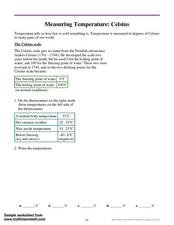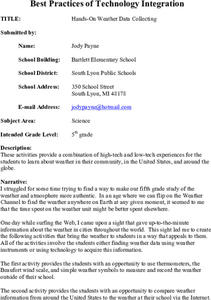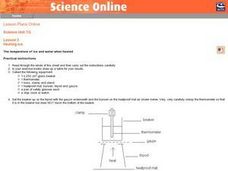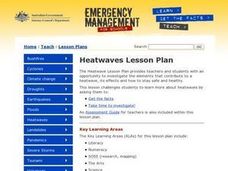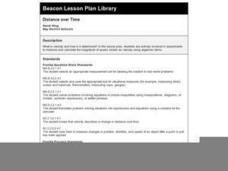Curated OER
Measurement Temperature: Celsius
In this Celsius worksheet, students review the Celsius scale and then mark temperatures for the first thermometer. Students then study the temperatures on the thermometers and write the temperatures.
Curated OER
Scientific Tools
Students list different uses for common scientific instruments. They identify appropriate instruments to measure length, temperature, and mass. Pupils are given a copy of the "Science Tools" task sheet, students place the correct number...
Curated OER
Hot Rocks
Students demonstrate that setting of plaster and cement is a change, which involves a release of heat energy, use data collected experimentally to construct comparison graphs and analyze the graphs to make predictions about future...
Curated OER
Hands-On Weather Data Collecting
Fifth graders use Internet sites to complete a study of weather and atmosphere. They compare weather data from cities around the world. They use thermometers, the Beaufort wind scale, and simple weather symbols to measure weather around...
Curated OER
Color Me Hot
Seventh graders use the scientific method, to observe, record and analyze the data they gathered. They make observations using their five senses. Students compare, contrast and draw conclusions based on the observations and data...
Curated OER
Hot Friction
Sixth graders use small electronic devices known as thermistors to measure the temperature beneath an object such as a coffee cup as it slides across a surface. By choosing different surfaces, 6th graders can compare in a quantitative...
Curated OER
Forecasting Weather
In this weather instructional activity, students conduct an experiment where they record the weather observations for a week. Then they determine the air pressure using an aneroid barometer and estimate the amount of sky covered by...
Curated OER
Was Goldilocks Telling the Truth?
Sixth graders explore the movement of heat between objects. In this heat instructional activity, 6th graders use the scientific method to conduct guided experiments regarding conduction, convection, and radiation.
Curated OER
Exothermic Rehydration of Gypsum
Students observe exothermic reactions in the lab using plaster. In this chemistry lesson, students collect data from their experimental set up every five minutes. They explain the different stages in the hardening of plaster.
Curated OER
Transforming Food Energy: A Balancing Act
Students explain their role as consumers. They use a purchased calorimeter or make their own simple calorimeter to measure the energy content in selected foods. This interesting lesson really gets students thinking about what they eat.
Curated OER
To Every Thing There Is A Season...
Students use the artwork by Robert Harris to examine the four seasons. In groups, they identify the clothing worn in the artwork and create a dance which resembles the painting. They also practice reading a thermometer and identify...
Curated OER
Measuring Weight, Mass, and Capacity
Second graders measure weight, mass, and capacity. In this measurement instructional activity, 2nd graders model how to measure amounts of liquid by using containers that measure one cup, one pint, and one quart. Students compare the...
Curated OER
Salinity
Learners define and discuss salinity, conduct classroom experiment to determine salinity of water sample by using hydrometer, record predictions, and demonstrate understanding of how salinity influences object's ability to float in water.
Curated OER
Big on Blubber: How do Whales Stay Warm?
Learners explore biology by conducting a science experiment in class. In this whale anatomy lesson, students identify the use of whale blubber for the animal to stay warm in cold waters while utilizing ice, vegetable oil, plastic bags...
Curated OER
Insulators, Conductors, and Energy Transfer
Third graders conduct experiments to determine what types of material make good insulators. They prepare a graph of time vs. temperature for their sample. They choose a graph using each kind of material to display for class analysis and...
Curated OER
Heating Ice: The temperature of ice and water when heated
Seventh graders read and follow the instructions on the worksheet. They make a table of their results. Students use about 100 cm^3 of water and ice mixture. They heat the water/ice with a Bunsen burner. Temperature is recorded every 30...
Curated OER
Cool Suits
Students examine the materials that are used to make space suits. They complete an experiment in which they test different materials in different colors to determine the best one for keeping astronauts comfortable. They analyze the data.
Curated OER
Weather Tools
Students explore Earth science by participating in a weather identification activity. In this scientific instrument instructional activity, students identify several weather related tools such as the weather vane, thermometer and rain...
Curated OER
Heat Waves
Students explore weather patterns by conducting an experiment in class. In this heatwaves lesson, students identify how weather raises to an unhealthy degree and the effect it can have on people and their environment. Students utilize a...
Curated OER
How Animals Meet Their Needs
Fourth graders research the Internet for facts relating to the animal of their choice. They use information from their Internet search to complete their animal project. TLW use his or her own words when writing their report.
Curated OER
Weather Watchers
Students practice using objective and quantitative means to describe and compare the weather. They compile weather conditions and create a spreadsheet to record their findings.
Curated OER
Distance over Time
Learners analyze velocity and how it is determined. They experiment with velocity in order to measure and calculate the magnitude of speed. They use examples in their novel "Skateboard Renegade" to relate velocity to real life situations.
Curated OER
Chymosin Demonstration
Students perform a demonstration which provides an example of the use of a protein produced by biotechnology for making ice cream, custard, and cheese.
Curated OER
Up We Go
First graders examine the use of number lines in problem solving situations in this series of lessons. They participate in activities in which they move forward and backward on number line on the playground before doing paper and pencil...
